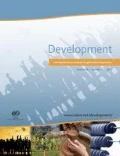Abstract
Cecilia M. B. Sardenberg reflects upon the experience of NEIM – the Nucleus of Interdisciplinary Women's Studies of the Federal University of Bahia – in engaging with ‘empowerment’. NEIM has been involved in 27 years of activism in order to bring about changes, both structural as well as in women's individual lives, towards insuring greater autonomy for women and our increasing participation in decision-making. She opens up questions about how to engage more directly and more openly with the concept of empowerment, and considering its theoretical underpinnings and their methodological as well as wider political implications.
Similar content being viewed by others
Notes
I would like to thank Andrea Cornwall for sharing with me interviews that she conducted with feminist activists on empowerment, a number of which I draw upon in this article.
References
Aithal, Vathsala (1999) ‘Empowerment and Global Action for Women: Theory and practice’, Working Papers, Kvinnforsk, University of Tromsø, available at http://pdfind.com/empowerment-and-global-action-of-women/.
Allen, Amy (1999) The Power of Feminist Theory, Domination, Resistance, Solidarity, Boulder, CO: Westview Press.
Allen, Amy (2005) ‘Feminist Perspectives on Power’, in Edward N. Zalta (ed.) Stanford Encyclopedia of Philosophy (Fall 2008 edition), http://plato.stanford.edu/entries.
Batliwala, Srilatha (1994) ‘The Meaning of Women's Empowerment: New concepts from action’, in Gita Sen, Adrienne Germain and Lincoln C. Chen (eds.) Population Policies Reconsidered: Health, empowerment and rights, Boston: Harvard University Press.
Costa, Ana Alice (1999) ‘Gênero, Poder e Empoderamento das Mulheres’, Available in: http://www.agende.org.br/docs/file/dados_pesquisas/feminismo/empoderamento%20-%20Ana%Alice.pdf.
Hartsock, Nancy (1987) ‘Foucault on Power: A theory for women?’, in Monique Leijenear, Kathy Davis, Jantine Oldersma, Claudine Helleman and Dini Vos (eds.) The Gender of Power: A symposium, Leiden: Kartens B.
Kabeer, Naila (1999) ‘Resources, Agency, Achievements: Reflections on the measurement of women's empowerment’, Development and Change 30 (3): 435–464.
León, Magdalena (ed.) (1997) Poder y Empoderamiento de lãs Mujeres [Power and Women's Empowerment], Bogotá: Coedición del Tercer Mundo Editores,Fondo de Documentación Mujer Y Genero de laUniversidad Nacional de Colômbia.
Mosedale, Sarah (2005) ‘Policy Arena. Assessing Women's Empowerment: Towards a conceptual framework’, Journal of International Development 17: 243–257.
Romano, Jorge O (2002) ‘Empoderamento: Recuperando a Questão do Poder no Combate à Pobreza [‘Empowerment: Recovering the Issue of Power in Combating Poverty’]’, in Jorge O. Romano and Marta Antunes (orgs.) Empoderamento e Direitos no Combate à Pobreza [Empowerment and Rights in the Combat Against Poverty], Rio de Janeiro: ActionAid.
Sardenberg, Cecilia M.B (ed.) (forthcoming) Trilhas do Empoderamento de Mulheres. Perspectivas da América Latina, Salvador, Bahia: NEIM/UFBA: Pathways of Women's Empowerment.
Sardenberg, Cecilia M.B (2000) ‘Introducing Gender Sensitizing to Elementary School Teachers in Rural Bahia, Brazil’, in Parto Theherani-Kröner, Mathilde Schmitt and Uta Hoffmann- Altmann (eds.) Knowledge, Education and Extension for Women in Rural Areas, Berlin: Humboldt-Universität zu Berlin, pp. 46–54.
Sardenberg, Cecilia M.B (2008) ‘Liberal vs Liberating Empowerment: A Latin American feminist perspective in conceptualizing women's empowerment’, IDS B ulletin 39 (6): 18–27 December 2008 © Institute of Development Studies.
Sardenberg, Cecilia M.B (2009) ‘Liberal vs Liberating Empowerment: Conceptualising women's empowerment from a Latin American feminist perspective’, Pathways Working Papers 7. Brighton, UK: Pathways of Women's Empowerment: Institute of Development Studies.
Sardenberg, Cecilia M.B., Ana Alice Costa and Elizete Passos (1999) ‘Rural Development in Brazil: Are we practising feminism or gender?’ Gender and Development 7 (3): 28–38.
Thayer, Millie (2000) ‘Traveling Feminisms: From embodied women to gendered citizenship’, in Michael Burawoy, Joseph A. Blum, Sheba George, Zsuzsa Gille, Teresa Gowan, Lynne Haney, Maren Klawiter, Steve H. Lopez, Sean O’Riain and Millie Thayer (eds.) Global Ethnography: Forces, connections, and imaginations in a postmodern world, Berkeley: University of California Press.
Additional information
Reflects upon the experience of NEIM – the Nucleus of Interdisciplinary Women's Studies of the Federal University of Bahia – in engaging with ‘empowerment’
Rights and permissions
About this article
Cite this article
Sardenberg, C. Women's Empowerment in Brazil: Tensions in discourse and practice. Development 53, 232–238 (2010). https://doi.org/10.1057/dev.2010.33
Published:
Issue Date:
DOI: https://doi.org/10.1057/dev.2010.33



